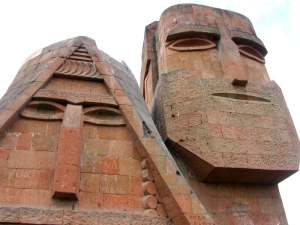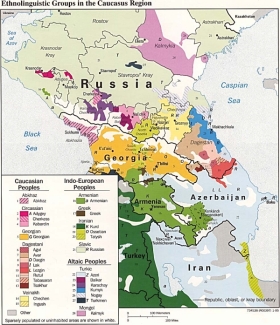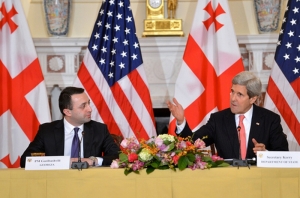
Map of Armenia and the self-proclaimed Nagorny Karabakh Republic (NKR) in the Caucasus
Previous posts on this publication have been devoted to Ukraine, Georgia, and Moldova. Today’s post shifts the focus on Georgia’s southern neighbor, Armenia. Like Georgia, Armenia shares a very strong sense of national pride, related to its unique art and culture as well as its centuries-old history. Also like the Georgians, Armenians are independent-minded and are generally adverse to Russian imperialism, though, again like their Georgian counterparts, they are also fond of the Russian culture and people. Indeed, Armenia is an ancient Christian country with a long tradition of statehood. The Christian faith arrived here via two of the original twelve apostles of Christ and in AD 301, Armenia became the first nation to officially adopt Christianity as its national faith. This had a profound impact on the development of Armenia’s cultural and literary traditions and resulted in the creation of the unique Armenian alphabet invented in the 5th century and written horizontally from left-to-right, thus indicating a Western orientation. At the same time, similar developments also profoundly affected Georgia, which also adopted a unique alphabet with a left-to-right directionality.
Armenia, along with Georgia, Ukraine, and Moldova, was one of four countries that actively participated in the Brussels-backed EaP. Yet, on September 3, 2013, Yerevan made a sudden volte-face on signing its Association Agreement deal with the EU (basically the same deal that Ukraine later refused in November). Instead, it opted for membership in Moscow’s Eurasian Union. This shocked many commentators, who at the time viewed Armenia’s signing of the EU Association Agreement as a foregone conclusion. Many observers, both inside and outside of Armenia, quickly concluded that the Armenia’s President Serj Sargsyan was pressured by Russian President Vladimir Putin to join the Eurasian Union.

Armenia’s Serj Sargsyan and Russia’s Vladimir Putin immediately after their 3 September meeting.
However, I believe that it is more plausible to conclude that Sargsyan managed to squeeze out the best possible terms for Eurasian Union membership from the Kremlin. This would explain the body language between the two leaders when the decision was announced. Sargsyan was visibly pleased, as if he had received something, whereas Putin looked somewhat satisfied, though also as if Sargsyan had extracted major concessions out of him. Sargsyan has stated publicly to the Armenian media that he managed to secure “major concessions” from the Russian leader. What these concessions are is not yet known. However, they must have been quite substantial since Armenia was willing to sell the remaining 20% share of its gas sector to Russia’s Gazprom and guarantee that this agreement would remain unchanged until 2043. This action remains controversial with both within the Armenian parliament and on the streets of Yerevan, where Armenian students have launched demonstrations against it. The vote to validate the deal was boycotted by the opposition in the Armenian parliament. Still, though, the basic idea of joining the Eurasian Union has been broadly endorsed by all sectors of the Armenian political elite, including one of Sargsyan’s most vocal critics, former President Levon Ter-Petrosyan. Though Sargsyan has not yet announced the benefits of Eurasian Union membership for Armenia, they are likely tied to security concerns stemming from the dispute with Azerbaijan over Nagorny Karabakh.

Oleh Tyahnybok, leader of Ukraine’s far-right Svoboda party (zbroya.info)
Then in yet another more recent shocking move, on March 27 Armenia voted with Moscow against a UN Resolution condemning the incorporation of Crimea into Russia. Earlier, Yerevan seemed to have at least partially endorsed the Crimean move, with Sargsyan phoning Putin and hailing it as “yet another example of realization of peoples’ right to self-determination through a free expression of will.” The latter caused a slight rupture in Ukrainian-Armenian relations. Oleh Tyahnybok, the leader of the far-right Svoboda party, urged the recall of Kiev’s ambassador to Yerevan, a demand with which the Yatsenyuk government eventually complied. What is behind Armenia’s pro-Russian posturing on Crimea? Is it under pressure from Moscow with regard to security and energy ties? Possibly. However, a far more likely scenario is that the Armenians actually see a precedent in Crimea for Nagorny Karabakh.

The famed 13th century Armenian Gandzasar Monastery in Nagorny Karabakh (Gandzasar.com)
So what exactly is Nagorny Karabakh and why does Armenia attach such importance to it? Nagorny Karabakh is a disputed, mountainous region sandwiched between Armenia and Azerbaijan. Its very name is a testament to its checkered history with “nagorny” being Russian for “mountainous,” “kara” being Turkish for “black,” and “bakh” being Farsi for “garden.” The current Armenian President Sargsyan is a native of Karabakh as was his predecessor Robert Kocharyan. De jure Karabakh is recognized internationally as being part of Azerbaijan. De facto the region is a self-proclaimed independent state, closely tied with Armenia. Yet no state, including Armenia, presently recognizes it internationally. The landscape of Karabakh is littered with old, historic Armenian churches and monuments. Its local population is comprised entirely of ethnic Armenians who speak their own distinct musical dialect, heavily influenced by Russian and Farsi with significant remnants of the old Classical Armenian or grabar (the Armenian equivalent of what Old Slavic is to Russian or Ukrainian or what Latin is to Italian). The dialect is so unique that even native Armenian speakers have difficulty understanding it. The Karabakh Armenians are known as a strongly independent mountain people and are said to be “more Armenian than Armenians.” Many prominent Armenian military figures that fought in the armies of Tsarist Russia and the USSR came from Karabakh. During World War II, a significant number were renown for their bravery in the war.

We Are Our Mountains (also known as Tatik u Papik (Grandma and Grandpa) in Armenian), a statue that is widely regarded as a symbol of Karabakh’s identity. It was completed by the sculptor Sargis Baghdasaryan in 1967 and is located near Stepanakert, the capital of the self-proclaimed Nagorny Karabakh Republic. (Barev Armenia.com)
The area of Nagorny Karabakh, known as “Artsakh” in Armenian, is of particular significance to Armenians historically and culturally. Historically, it formed one of the easternmost provinces of the Kingdom of Armenia. Along with the province of Utik, Artsakh was disputed at times with the neighboring Caucasian Albanians, a Christian people, unrelated to the Albanians of the Balkans, whose core homeland encompassed significant portions of modern Azerbaijan east of the Kura River, west of the Absheron and Shirvan, and south of the Greater Caucasus range. In the Middle Ages, the Kingdom of Armenia enjoyed significant prosperity under the Bagratuni dynasty which also had a branch ruling in neighboring Georgia. This kingdom collapsed amid Armenian infighting, Byzantine opportunism, and invasions by the Seljuk Turks. It was only the province of Artsakh (today’s Nagorny Karabakh) along with the neighboring region of Syunik (today the southermost province of Armenia) that managed to maintain some level of independence and autonomy. Together, these two regions became to Armenia what Piedmont-Sardinia became to Italy. To Armenians, they became a center for national liberation and unification.

18th Century Armenian diplomat Israel Ori sought the aid of Peter the Great to free Armenia and Georgia from Persian suzerainty.
By the 18th century, both regions were still governed by Armenian nobles and were under Persian suzerainty with Artsakh now known by the name of “Khachen.” The local Armenian nobility was eager to secure protection from a Christian power and thus sought aid from Imperial Russia. The diplomat Israel Ori was especially notable in this regard. A noble from Sisian in the Syunik region, Ori secured an audience with Tsar Peter the Great, in which he detailed the persecution of the Armenian and Georgian people who lived under the sphere of Persia and under the rule of the Ottoman Empire. Peter, already interested in gaining access to the silk and spices of Persia, Central Asia, and India, now found an additional reason to expand Russia into the Caucasus. He readily agreed with Ori’s proposal and sent a delegation to Etchmiadzin, the seat of the Armenian Apostolic Church (then under Persian rule).

Davit Bek as portrayed by Hrachia Nersisyan for the 1944 Soviet Armenian feature of the same name. The film (the Armenian equivalent to Eisenstein’s Aleksandr Nevsky) was meant to foster patriotic feelings among Armenians during the time of the Nazi invasion of the USSR.
Unfortunately, Ori died in 1711 and thus was unable to see his dream realized. Yet, he nevertheless laid the groundwork for Russia’s intervention in the region. The movement for the liberation of the Caucasus from Persia continued under the Armenian Catholicos Asdvadzadur as well as the Georgian King Vakhtang VI the Scholar (whose descendent would later be Prince Pyotr Bagration, the great hero of the Napoleonic War). Having soundly defeated the Swedes in the Great Northern War in 1721, Peter finally set his sights on the Caucasus. The time seemed perfect as Persia had descended into a civil war. Vakhtang camped in Ganja (in present-day Azerbaijan) with a Georgian-Armenian force 40,000 strong awaiting Peter’s army. He hoped that the Tsar would liberate Georgia and Armenia from the Persian and Ottoman yoke. However, Peter’s Caspian and Caucasian campaigns against Persia proved disastrous and the Russian aid never arrived. Feeling threatened by Russia and taking advantage of internal turmoil in Persia, the Ottoman Empire intervened to violently attack the Georgians and Armenians for entertaining the idea of Russian aid. However, Davit Bek, an Armenian rebel leader of noble stock in the service of the Georgian court managed to hold off the Turks until his death in 1728. In 1736, Nader Shah reasserted Persian authority over the region and reaffirmed the autonomy of the Armenian princes, who had assisted Persia in expelling the Ottomans.
Following the death of Nader Shah in 1747, the regional autonomies of Khachen and Syunik lasted until 1750 when both were incorporated by a local Muslim Khan into the neighboring Karabakh Khanate with the aid of an Armenian prince. This was a consequence of the fact that the region had since become engulfed in infighting among its different Armenian noble families. The local nomadic Turkic Muslim population (the predecessors of today’s Azerbaijanis) saw an economic connection between the lowland Karabakh area that they had known within their khanate and the highland Khachen principality. They used both areas alternatively for seasonal grazing of their sheep. The incorporation of highland Khachen into the Karabakh Khanate only reinforced this perception of economic unity with Lowland Karabakh among the Turkic nomads. Henceforth, the Armenian region of Khachen gradually became known as “Highland Karabakh” in contrast with the neighboring lowland areas located entirely within present-day Azerbaijan that had been already known as Karabakh.
Eventually, the Russians managed to secure a foothold in the region with the annexation of Georgia in 1800. Then in 1813, St. Petersburg renewed its assault on Persia, seizing Baku and the Caspian coastline and further inland, Highland Karabakh and Syunik (also known by now by the name of “Zangezur” after the area’s distinct mountain range). It was not until 1828 that Russia managed to acquire the remainder of the present-day Armenian republic with Yerevan and Etchmiadzin. Yet, the dates here are significant for Highland Karabakh remained administratively outside of the confines of the Erivan (Yerevan) guberniya (province) within the Russian Empire.

The remnants of the Armenian quarter of Susha after the pogrom of March 1920 (US National Archives).
With the collapse of Russian power in the region following the Russian Revolution of 1917 and the Russian Civil War, the Caucasus at first attempted to unite into a single Transcaucasian Federation. This attempt at unity failed between both the external ambitions of the Ottoman Empire and internal divisions among the Caucasus peoples. The federation was dissolved and three new states emerged: Armenia, Georgia, and Azerbaijan. Armenia was constantly under threat from the Ottomans who had initiated a systematic campaign of genocide against their Armenian population in 1915 in which 1.5 million Armenians perished. A large number of starving refugees from the genocide poured into the newly-independent republic and the government in Yerevan had few resources to deal with them. The new republic also faced territorial disputes. The dispute over Highland Karabakh with neighboring Azerbaijan proved especially contentious. Ethnic violence engulfed the region. A Karabakh Armenian uprising in March 1920 was violently crushed by Azerbaijani forces and an anti-Armenian pogrom ensued in the town of Shusha (also known as Shushi).
By the time of the region’s Sovietization, the area passed into provisional Azerbaijani control, though this was deeply resented by the local Armenians. Meanwhile, the Armenian Republic itself was absorbed by the Bolsheviks in 1920, with Moscow ceding some portions, including the Armenian national symbol Mount Ararat and the ruins of the historic medieval Armenian capital Ani, to now-Kemalist Turkey. The Bolshevik presence in Armenia was met with significant resistance in Syunik. In 1921, the Armenian mountaineers of this region fled to the highlands and launched a major revolt against Soviet rule. The situation was so intensely out of control that the Soviet military was called in to establish order. To placate the Armenians and to subdue the rebels, the Soviets periodically promised that the region of Highland Karabakh would be incorporated into Soviet Armenia.
In the end, the Soviets managed to crush the rebellion. The highland mountaineers of Syunik fled across the border into neighboring Iran. The crushing of the rebellion literally occurred just as the Kavburo was voting to determine whether or not Highland Karabakh should become part of Soviet Armenia. Initially the delegates voted in favor of this but when the fortunes changed on the ground in Syunik, the Soviet Azerbaijani leader Narimanov managed to convince his colleagues that there was no need to make Highland Karabakh part of Armenia anymore. He further threatened Soviet leaders with a possible cessation of oil supplies from Baku. Eager to avoid this and to quickly resolve territorial issues to maintain their control in the region, the Bolsheviks acceded to Narimanov’s demand. Hence the decision was reversed and Highland Karabakh was granted to Soviet Azerbaijan provided that it be granted autonomy in order to satisfy the local Armenian population. Such a decision was never accepted by the Armenian locals who wanted to be part of Soviet Armenia.

Yerevan 1988
Throughout the Soviet era, the Karabakh Armenians periodically petitioned Moscow for the area to be reassigned to Armenia with no success. When Mikhail Gorbachev initiated his policy of glasnost (political openness) in the late 1980s, the Karabakh Armenians seized the opportunity. Petitions, accompanied by peaceful protests in both Armenia and Karabakh, requested that the Soviet leader transfer the region to Armenia. By February 1988, the demonstrations in Yerevan had grown to as many as one million people (about one third of the Armenian population). Fists raised, the protestors shouted slogans such as “Ka-ra-bakh” and “Hay-as-stan” (the Armenian name for Armenia). In addition to Karabakh, the protests also focused on other issues as well, notably environmental concerns such as clean air and the controversial Metsamor Nuclear Power Plant. The leaders of the demonstrations were a group of individuals known as the “Karabakh Committee.” However, unlike Zviad Gamsakhurdia in Georgia, the leaders of the Karabakh Committee like Levon Ter-Petrosyan, Vazgen Manukyan, Ashot Manucharyan, Hambartsum Galtsyan, and others were not national chauvinists but liberals influenced by progressive Thaw-era Soviet values.

Memorial to the Armenian Earthquake Victims, Washington, D.C. (Panoramio)
Unfortunately, the situation turned violent when anti-Armenian pogroms broke out in the Azerbaijani city of Sumgait. The protests in Armenia and Karabakh became even more impassioned and tension between Armenians and Azerbaijanis only continued to rise. Soon, all Armenians from Azerbaijan left for Armenia and all Azerbaijanis left Armenia for Azerbaijan. The horrible earthquake in Armenia in December 1988 only seemed to compound the crisis. Measuring a magnitude of 6.8 on the Richter scale, between 25,000 to 50,000 people died and as many as 130,000 were injured. Azerbaijan also instigated a total blockade against Armenia and Karabakh, preventing the delivery of crucial relief aid to Armenian earthquake victims. Meanwhile, Moscow’s perceived inaction on the crisis by local Armenians fueled the growth of a national secessionist movement in Armenia by 1990.

Armenian Refugees from Karabakh. The conflict over the disputed territory displaced hundreds of thousands of civilians on both sides. (BBC)
By the time both Armenia and Azerbaijan achieved independence from the USSR in 1991, the conflict over Karabakh had erupted into a full-scale war. The war left tens of thousands of people dead or displaced on both sides. Though the Karabakh Armenians managed to secure their own de facto independence and a “buffer zone” of territory connecting them to Armenia proper, Turkey joined a blockade against Armenia and Karabakh. This precipitated a grave energy crisis that was only compounded by economic difficulties and a large number of IDPs from the war and the 1988 earthquake. The borders with Turkey and Azerbaijan remain closed and the situation has remained very tense since. Consequently, a Russian military base in Armenia, located on the Turkish-Armenian border plays a major role as a guarantor for stability and security in the region.

Azerbaijani President Ilham Aliyev
Meanwhile, exploiting its oil resources, Azerbaijan has increased its military spending in recent years and has been empowered to be even more nationalistic. President Ilham Aliyev’s controversial statements have raised serious concern in Yerevan. In speeches and messages, he has referred to Armenia as a “country of no value,” stated that “Armenians are guests in Yerevan,” and that the Karabakh Armenians should accept Azerbaijani rule or be forced to emigrate. Official Baku likewise refuses to allow individuals bearing Armenian surnames to enter their country (even if they are not citizens of Armenia) and has maintained the blockade against Armenia, preventing crucial civil society and people-to-people contacts so important to a lasting peace.
In September 2012, Aliyev declared Ramil Safarov a “National Hero.” Safarov killed a young Armenian man in his sleep with an axe during a NATO Partnership for Peace seminar. In February 2013, an Azerbaijani author, Akram Aylisli, who has called for peace and dialogue in the Karabakh dispute, was threatened by officials affiliated with Azerbaijan’s ruling political party who have called for a bounty on the author’s ear for $15,000 and who have staged public book burnings of his works. Indeed, the level of anti-Armenian sentiment prompted one popular Russian-Jewish television journalist to draw parallels between the official Azerbaijani attitude toward Armenians and that of Nazi Germany toward the Jews. All of this has only evoked painful memories among Armenians about the tragic 1915 Genocide and has only fueled greater distrust between Armenians and Azerbaijanis. It also has reinforced the need for Russian security in the region.
Now with the Crimea united with Russia, many in both Armenia and Karabakh see the potential possibility for a direct reunification between their two entities in the case of a future Azerbaijani attack. The precedent of the incorporation of Crimea into Russia via a democratic plebiscite has certainly buoyed hopes in Karabakh for the region’s eventual reunification with Armenia, even if Yerevan-based analysts have emphasized that the two situations are entirely different. Meanwhile, official Baku has been noticeably quiet in the midst of all of this. What will happen next remains to be seen.






































